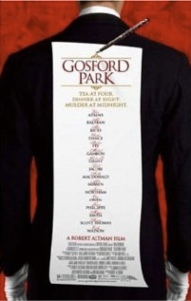Well, it’s December, a.k.a. Christmas month. Are we doing an Octoberween kind of deal for December? Christembermas? I dunno, nobody tells me nothin’. I was totally going to get seasonal, too, but maybe I’ll put that off a while and just review a mediocre movie that came out eleven years ago.
Gosford Park (2001)
The Plot: A bunch of people and their servants go to a big house for a weekend. One of them gets murdered. The others squabble. A couple of them try to figure out who the killer is, but mostly no one cares.
This movie won Best Original Screenplay at the Academy Awards in 2002, beating out much more deserving movies like The Royal Tenenbaums, Amélie, and Memento.Seriously, Academy, what gives? Gosford Park is not a badly written film, like, on a dialogue level, but it suffers a few fundamental problems with plot and character.
- The Mystery—The murder occurs about halfway through the film, and it is obvious who did it. The murder also seems of little consequence to the other characters, and so seems of little consequence to the audience as well.
- The Characters—This one has subcategories, into which I think I’m going to launch right away.
- The Dramatis Personae: Constance Trentham (Maggie Smith), William McCordle (Michael Gambon), Sylvia McCordle (Kristin Scott Thomas), Isobel McCordle (Camilla Rutherford), Lord Raymond Stockbridge (Charles Dance), Louisa Stockbridge (Geraldine Somerville), Anthony Meredith (Tom Hollander), Lavinia Meredith (Natasha Wightman), Ivor Novello (Jeremy Northam), Morris Weisman (Bob Balaban), Freddie Nesbitt (James Wilby), Mabel Nesbitt (Claudie Blakley), Rupert Standish (Laurence Fox), Jeremy Blond (Trent Ford), Henry Denton (Ryan Philippe), Inspector Thompson (Stephen Fry), Constable Dexter (Ron Webster), Mary MacEachran (Kelly Macdonald), Robert Parks (Clive Owen), Mrs. Wilson (Helen Mirren), Mrs. Croft (Eileen Atkins), Elsie (Emily Watson), Jennings (Alan Bates), Probert (Derek Jacobi), George (Richard E. Grant), Arthur (Jeremy Swift), Dorothy (Sophie Thompson), Sarah (Frances Low), Renee (Joanna Maude), Bertha (Teresa Churcher), Ellen (Sarah Flind), Janet (Flinty Williams), May (Emma Buckley), Lottie (Lisa Cohu), Ethel (Laura Harling), Maud (Tilly Gerard), Albert (Will Beer), Jim (Leo Bill), Fred (George Henderson Begg), Merriman (John Atterbury), Mr. Burkett (Frank Thornton), Strutt (Ron Puttock), and Pip the Dog (Widget the Dog).
- The writer, Julian Fellowes, thinks he’s writing an Ensemble In-House Mystery. In the vein of Agatha Christie, Fellowes tries to devote equal screen time to every character, allowing for a true ensemble film. Unfortunately, unlike Agatha Christie, Fellowes is dealing with an ensemble of 45. The film is 137 minutes long, which means that each character should get about three minutes of screen time. This does not allow for much character development. A few of the characters do stand out, but even those we never really get to know. The film lacks a clear main character.
- Of those forty-five, maybe five or six are likable characters. Everyone in this film is so preoccupied with class that it’s like watching just the bitchy characters from Mean Girls for two and a quarter hours, and no one gets their comeuppance, and no one learns the error of their ways.
- This movie is not The Rules of the Game meets Mouse Trap, which is clearly what it’s trying to be.
- Stephen Fry is hardly in it. Why would you tease the audience with Stephen Fry if he wasn’t going to be more important?
- The Themes—Upper class British people in 1932 are bad. So are lower class British people. Having such an intense division between the upper and lower classes is bad. Ever seen Schindler’s List? The theme of that movie is that the Holocaust was bad. Interestingly, literally everyone knew that going into the movie; Spielberg just hammers you over the head with it for 195 minutes. Gosford Park does a similar thing with a less important issue.
So, I’ve named three things that the screenplay for Gosford Park did badly. You’ll also recall that earlier I mentioned three other movies. Each of those did one of these perfectly. Memento nails mystery like nobody’s business. The Royal Tenenbaums is a textbook example of how to write an ensemble cast. Amélie is a delightful film with subtly written, uplifting themes of Romance and romance. It’s a French movie that doesn’t overplay its message. Are we all fully appreciating the gravity of that last comment?
Harsh as I’ve been, though, Gosford Park is not a terrible movie; it’s not even a bad movie; it’s just really confused. It aims too high at a target of which it is largely unsure. The result is a rambling, befuddled, overrated pseudo-mystery about the unfortunate status quo of social class relations in 1930s Britain. What I’m really saying here is that I didn’t love it, and wouldn’t particularly recommend it, though the poster is nice.









I concur!!!
And, most notably, still better than Predator 2.
Pingback: Second Breakfast Saw That New Woody Allen Movie | Rooster Illusion